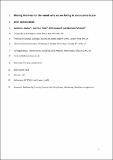Files in this item
Missing the trees for the wood : why we are failing to see success in pro-poor conservation
Item metadata
| dc.contributor.author | Davies, Tamara Ellen | |
| dc.contributor.author | Fazey, I.R.A. | |
| dc.contributor.author | Cresswell, Will | |
| dc.contributor.author | Pettorelli, N. | |
| dc.date.accessioned | 2015-06-04T11:10:04Z | |
| dc.date.available | 2015-06-04T11:10:04Z | |
| dc.date.issued | 2014-08 | |
| dc.identifier | 77198825 | |
| dc.identifier | 15e37e6d-0aba-4f07-9659-4314f479685a | |
| dc.identifier | 84904964408 | |
| dc.identifier | 000340255900005 | |
| dc.identifier.citation | Davies , T E , Fazey , I R A , Cresswell , W & Pettorelli , N 2014 , ' Missing the trees for the wood : why we are failing to see success in pro-poor conservation ' , Animal Conservation , vol. 17 , no. 4 , pp. 303-312 . https://doi.org/10.1111/acv.12094 | en |
| dc.identifier.issn | 1367-9430 | |
| dc.identifier.uri | https://hdl.handle.net/10023/6752 | |
| dc.description | Date of Acceptance: 18/10/2013 | en |
| dc.description.abstract | Pro-poor conservation strategies are touted as a panacea for achieving biodiversity conservation and poverty reduction, yet there remains limited evidence for success in achieving these dual objectives. Is this lack of evidence a sign that the approach is failing or an indicator that we are not capturing appropriate measures of success? In this review, we demonstrate that the lack of evidence for success in pro-poor conservation can be attributed to focusing on the bigger picture and overlooking the details. This has led to two fundamental flaws, (1) an ambiguous use of definitions and (2) inappropriate monitoring, both of which are compounded by limited understanding between traditional scientific disciplines and which render true conclusion of success impossible. Due to the current lack of evidence, pro-poor conservation risks basing decisions on belief rather than evidence, repeating mistakes and missing opportunities to replicate successes. We propose five key recommendations that will facilitate the identification of successful pro-poor conservation interventions and the conditions under which they work. Adoption of these recommendations will ensure pro-poor conservation is built on clear definitions and engages in meaningful participation with rigorous monitoring and reporting of outcomes, aiding replication and scaling up of pro-poor conservation successes in intelligent and evidence-based ways. | |
| dc.format.extent | 481747 | |
| dc.language.iso | eng | |
| dc.relation.ispartof | Animal Conservation | en |
| dc.subject | Biodiversity | en |
| dc.subject | Poverty | en |
| dc.subject | Success | en |
| dc.subject | Interdisciplinary | en |
| dc.subject | Monitoring | en |
| dc.subject | Adaptive management | en |
| dc.subject | QH301 Biology | en |
| dc.subject | SDG 1 - No Poverty | en |
| dc.subject.lcc | QH301 | en |
| dc.title | Missing the trees for the wood : why we are failing to see success in pro-poor conservation | en |
| dc.type | Journal item | en |
| dc.contributor.institution | University of St Andrews. Geography & Sustainable Development | en |
| dc.contributor.institution | University of St Andrews. School of Biology | en |
| dc.contributor.institution | University of St Andrews. Scottish Oceans Institute | en |
| dc.contributor.institution | University of St Andrews. Institute of Behavioural and Neural Sciences | en |
| dc.contributor.institution | University of St Andrews. St Andrews Sustainability Institute | en |
| dc.contributor.institution | University of St Andrews. Centre for Biological Diversity | en |
| dc.identifier.doi | 10.1111/acv.12094 | |
| dc.description.status | Peer reviewed | en |
This item appears in the following Collection(s)
Items in the St Andrews Research Repository are protected by copyright, with all rights reserved, unless otherwise indicated.

